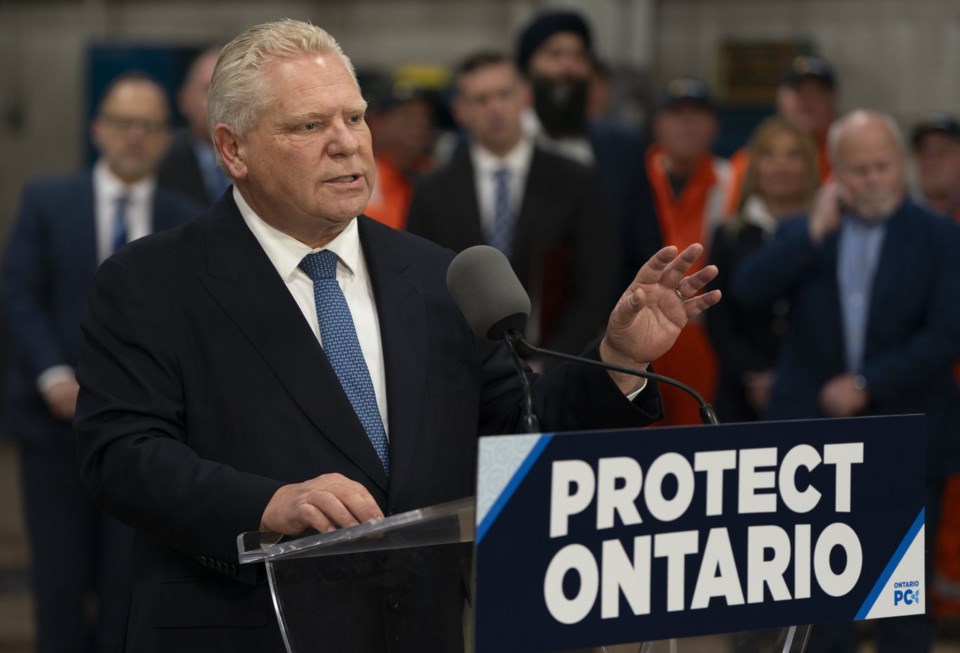OTTAWA — U.S. President Donald Trump said Monday he thinks he'll have another "very good conversation" with Prime Minister Justin Trudeau in the afternoon, when the two leaders are set to speak about the impending trade war.
He also said Canada is "very tough" to deal with and offered no suggestion he will back away from his plan to impose punishing tariffs on Tuesday.
Trump spoke to reporters in the Oval Office Monday after striking a deal with his Mexican counterpart to delay the imposition of 25 per cent tariffs on that country.
His comments suggested the goalposts are continuing to shift for Canada. Trump's stated rationale for the tariffs — which would be 10 per cent on energy and 25 per cent on everything else — is the need to exert pressure on Canada to stop the flow of illegal drugs and migrants into the U.S.
But Trump also has said Canada can avoid the tariffs if it becomes a state, and has suggested he would use "economic force" to make that happen. He's also cited the U.S. trade deficit with Canada, which is almost entirely based on Canadian oil and gas exports to the U.S.
"What I'd like to see, Canada become our 51st state," he said, adding "we don't need them for anything."
On Monday he raised new grievances about the financial sector and claimed that Canada is unfair to the U.S.
"We're not treated well by Canada, and we have to be treated well," he said, adding he had a number of questions for Trudeau when they spoke Monday morning, including why American banks aren't operating in Canada.
"I think we'll win most of the subjects, but for some reason a lot of things have been very unfair with Canada."
More than a dozen U.S. banks have a presence in Canada, including Citibank, J.P. Morgan and Comerica.
On Saturday, Trump signed executive orders that laid out a plan to hit Canada and Mexico with tariffs on Tuesday. He also added another 10 per cent tariff on Chinese goods.
On Monday morning, Mexican President Claudia Sheinbaum said that she's agreed to send 10,000 troops to the U.S. border to combat drug trafficking. Mexico first sent troops to its northern border in 2019, citing pressure from the U.S. to curb migration.
Trump said on Truth Social that after a "very friendly conversation" with Sheinbaum, he's agreed to pause the imposition of tariffs on Mexico for one month to allow for negotiations.
"I look forward to participating in those negotiations, with President Sheinbaum, as we attempt to achieve a 'deal' between our two Countries," Trump said.
Trudeau said on Saturday that he had been trying to speak directly with Trump since he took over the White House on Jan. 20 but hadn't been able to do so.
Trump relied upon the International Emergency Economic Powers Act to declare an economic emergency that allowed him to bypass Congress and impose the tariffs on his own.
The executive orders say the levies are a response to illegal immigration and drug smuggling. The order related to Canada says Mexican cartels are operating in the country and claims the modest amount of fentanyl intercepted at the northern border would be enough to kill "9.5 million Americans."
Trump also has said repeatedly he thinks tariffs are "beautiful" and claims they can make the U.S. wealthier, despite the short-term pain for businesses and consumers.
The move sparked concern and condemnation from American business and labour groups, including the National Association of Homebuilders, the United Steelworkers International and the U.S. Chamber of Commerce, among others.
"The imposition of tariffs under IEEPA is unprecedented, won’t solve these problems, and will only raise prices for American families and upend supply chains," John Murphy, the chamber's senior vice-president and head of international, said in a Saturday statement.
Both Canada and Mexico promised to strike back with counter-tariffs over the weekend.
Ottawa's counter-tariff plan would begin on Tuesday with 25 per cent tariffs on $30 billion in goods originating in the U.S.
In three weeks, after consulting with industry, the federal government plans to impose tariffs on another $125 billion in U.S. goods.
Trudeau said additional non-tariff measures are being discussed by the federal and provincial governments, including some related to critical minerals, energy and procurement.
It is not clear what, if anything, Canada could promise to do on its border to convince Trump to reverse course.
Ottawa laid out a $1.3-billion border plan in December that will add personnel, helicopters, drones, drug-sniffing dogs and surveillance towers to the border.
Trudeau met with opposition leaders on Sunday to discuss the Canadian response to tariffs, and Green Party Leader Elizabeth May said Trudeau told them it's "increasingly clear" nothing more Canada does on the border would make a difference.
She said Trudeau told them Trump's tariff policy "was not really about fentanyl. It was about Canada and our sovereignty."
Premiers have laid out plans for their own countermeasures. Several provinces have pledged to stop buying U.S. alcohol and to remove it from the shelves of provincial liquor stores, while others including Ontario will bar American companies from provincial contracts.
Conservative Leader Pierre Poilievre also called for the government to send Canadian Armed Forces troops and helicopters to the border.
In a social media post, Poilievre said Canada should also add thousands of border agents and "extend CBSA powers along the entire border, not just crossings."
— With files from The Associated Press
This report by The Canadian Press was first published Feb. 3, 2025.
Sarah Ritchie, The Canadian Press




